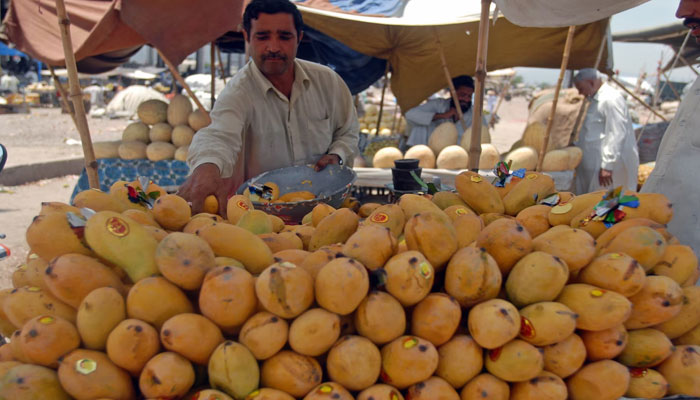Mango production to fall by 20pc due to harsh weather
Fruit and vegetable exporters anticipate a significant decline of around 20 percent in this year's mango crop
KARACHI: Fruit and vegetable exporters anticipate a significant decline of around 20 percent in this year's mango crop, which they attribute to the ongoing season's persistent adverse effects of climate change.
Pakistan has an annual capacity of approximately 1.8 million metric tonnes. However, due to the impact of climate change, it is feared that the production for the current season will be limited to 1.44 million metric tonnes, representing a decrease of 20 percent.
Waheed Ahmed, patron-in-chief of the All Pakistan Fruit and Vegetable Exporters Association (PFVA) said an extended winter and delayed arrival of summer had contributed in a decline in mango production, as well as a diminished ability to combat diseases in mango orchards.
“Mango crop in Pakistan is facing the adverse effect of climate change during the current mango season, leading to a likely drop of 20 percent in production,” Ahmed said in a statement on Thursday.
Ahmed warned that due to a prolonged winter and delayed summer season, mango production was decreasing, adding that the production of the fruit was directly affected by changing weather patterns. He urged research institutes and provincial agriculture departments to provide resources and awareness to mango farmers to help them avert the negative impact of climate change.
The changing weather patterns directly affect the mango crop, warranting an urgent attention from research institutes and provincial agriculture departments to support mango farmers and mitigate the negative impacts of climate change.
This year season's export target for mangoes has been set at 125,000 metric tonnes. Achieving the target would earn Pakistan approximately $100 million in foreign exchange. The export of mangoes is scheduled to commence on May 20, 2023. Major buyers of Pakistani mangoes include Gulf countries, Iran, Central Asian countries, and the United Kingdom.
Additional important markets encompass Europe, Canada, the United States, and Japan. The reduction in mango production, coupled with quality issues arising from climatic effects, has resulted in increased costs for exports.
“Factors such as higher freight expenses, packaging and transport costs, as well as the ongoing deteriorating law and order situation, political instability, and disruptions in delivery, are posing significant challenges to mango exports,” cautioned Ahmed. Within Pakistan, Punjab accounts for 70 percent of mango production, while Sindh contributes 29 percent, and Khyber Pakhtunkhwa holds one percent share.
Regarding export methods, Ahmed revealed that 50 percent of Pakistani mangoes are exported by sea, 35 percent by land, and 15 percent by air.
-
 Alix Earle And Tom Brady’s Relationship Status Revealed After Cosy Super Bowl 2026 Outing
Alix Earle And Tom Brady’s Relationship Status Revealed After Cosy Super Bowl 2026 Outing -
 Why King Charles Has ‘no Choice’ Over Andrew Problem
Why King Charles Has ‘no Choice’ Over Andrew Problem -
 Shamed Andrew Wants ‘grand Coffin’ Despite Tainting Nation
Shamed Andrew Wants ‘grand Coffin’ Despite Tainting Nation -
 Keke Palmer Reveals How Motherhood Prepared Her For 'The Burbs' Role
Keke Palmer Reveals How Motherhood Prepared Her For 'The Burbs' Role -
 King Charles Charms Crowds During Lancashire Tour
King Charles Charms Crowds During Lancashire Tour -
 ‘Disgraced’ Andrew Still Has Power To Shake King Charles’ Reign: Expert
‘Disgraced’ Andrew Still Has Power To Shake King Charles’ Reign: Expert -
 Why Prince William Ground Breaking Saudi Tour Is Important
Why Prince William Ground Breaking Saudi Tour Is Important -
 AOC Blasts Jake Paul Over Bad Bunny Slight: 'He Makes You Look Small'
AOC Blasts Jake Paul Over Bad Bunny Slight: 'He Makes You Look Small' -
 At Least 53 Dead After Migrant Boat Capsizes Off Libya
At Least 53 Dead After Migrant Boat Capsizes Off Libya -
 'God Of War' Announces Casting Major Key Role In Prime Video Show
'God Of War' Announces Casting Major Key Role In Prime Video Show -
 Real Reason Prince William, Kate Broke Silence On Andrew Scandal Revealed
Real Reason Prince William, Kate Broke Silence On Andrew Scandal Revealed -
 Drew Barrymore Responds To 'Charlie's Angels' Costar's Comments About Her
Drew Barrymore Responds To 'Charlie's Angels' Costar's Comments About Her -
 Shakira Slips Hard On Stage During Life Show
Shakira Slips Hard On Stage During Life Show -
 King Charles Speaks Out Over Andrew's Scandal: 'Stand Ready To Help Police'
King Charles Speaks Out Over Andrew's Scandal: 'Stand Ready To Help Police' -
 Dax Shepard Recalls Horrifying Accident That Almost Killed Him
Dax Shepard Recalls Horrifying Accident That Almost Killed Him -
 Logan Paul's Bodyguard Hits Fan On Super Bowl Day
Logan Paul's Bodyguard Hits Fan On Super Bowl Day




